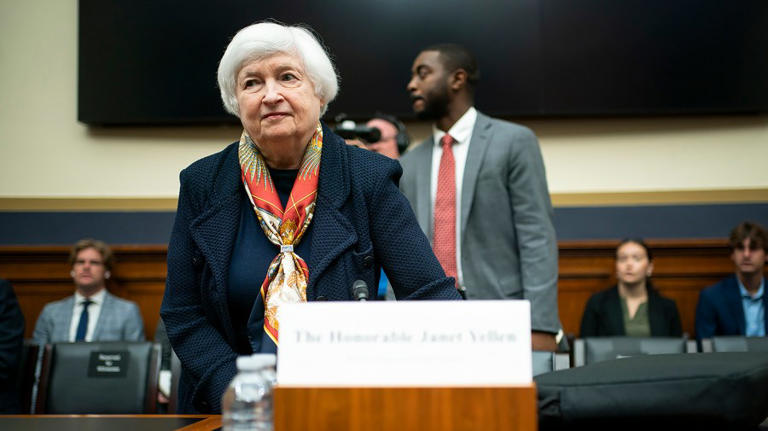
Treasury Secretary Janet Yellen will call out plans to vastly increase the scale of U.S. tariffs in a Thursday speech to the Council on Foreign Relations, taking a thinly veiled shot at former President Trump’s plans to hike import taxes.
Yellen, according to prepared remarks, will pan high, universal tariffs as inflationary and harmful to American businesses. While tariff proposals may have political appeal on the campaign trail, they could prove seriously disruptive to the global economy, she will argue.
“Calls for walling America off with high tariffs on friends and competitors alike or by treating even our closest allies as transactional partners are deeply misguided. Sweeping, untargeted tariffs would raise prices for American families and make our businesses less competitive,” Yellen’s remarks say.
Yellen will caution specifically against “[going] it alone,” warning of the risks posed by alienating U.S. allies with steep tariffs.
Her remarks come after a contentious interview between Trump and Bloomberg News editor-in-chief John Micklethwait, in which Trump doubled down on his promises to jack up tariffs. Trump has variously proposed instituting general tariffs at the level of 10 percent and 20 percent.
“It’s going to have a massive effect — positive effect. It’s going to be a positive effect,” Trump asserted earlier this week. “It must be hard for you to spend 25 years talking about tariffs as being negative and then have somebody explain to you that you’re totally wrong.”
Economists have championed free trade throughout the postwar period, through various forums, treaties and initiatives including the General Agreement of Tariffs and Trade, the North American Free Trade Agreement, and the World Trade Organization.
Academic economists have long supported the doctrine through the idea of “comparative advantage,” in which different countries and regions of the world should be encouraged to do what they naturally do best and to be rewarded for their products on an open global market.
But the subsequent decline in U.S. manufacturing jobs and security concerns raised by global competition have thrown a wrench into some traditional thinking on trade.
“The issues we face today, from broken supply chains, to climate change and global pandemic preparedness, to China’s industrial overcapacity, also mean we cannot simply draw from an old playbook,” Yellen will argue Thursday.
Supply chains have largely normalized during the robust economic recovery from the pandemic as inflation has fallen back down toward a 2 percent annual increase. Entrepreneurs and business experts have told The Hill that shipping and logistics channels between East Asian production centers and the U.S. are pretty much back to normal.
However, big pieces of legislation passed during the Biden administration, including a major climate technology package and a semiconductor manufacturing law, promise some degree of rejuvenation within the U.S. industrial base. Investment in manufacturing construction has boomed though hiring in the sector has yet to take off relative to historical levels.
Experts caution that a U.S. manufacturing renaissance is likely not in the cards.
“Deeply rooted forces common to all countries — technological change, shifting consumer spending patterns, and trade — account for lagging manufacturing employment and that these trends are unlikely to be reversed,” wrote Robert Z. Lawrence, nonresident senior fellow at the Peterson Institute for International Economics.
“The industrial sector’s historic role as an engine of opportunity and inclusive growth is unsustainable,” Lawrence’s book argues, cautioning against the “nostalgia” lurking underneath the recent return to industrial policy.


